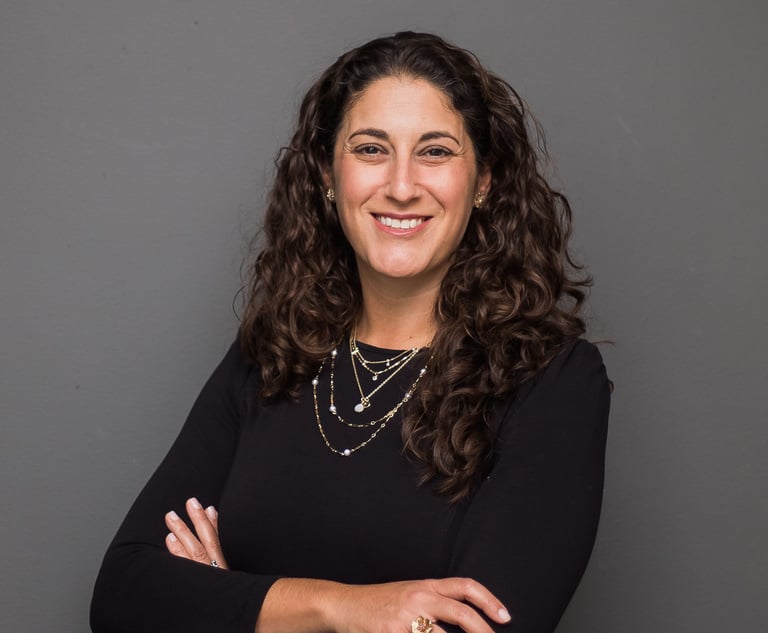Candidate: Jill Beck
Court: Superior Court
Party: Democrat
Pennsylvania Bar Association rating: Highly recommended
The following has been edited lightly for length and style.
The Legal Intelligencer: How would you describe your judicial philosophy?
Jill Beck: I believe in a judiciary that is engaged yet restrained. The judiciary is a separate but very important co-equal branch of government. Although it is not the role of the court to legislate, neither is it permissible for the court to serve as a rubber stamp for the legislative and executive branches of government (or the courts below). Appropriate deference to these bodies must be given when reviewing and interpreting their work, but it is solely in the court’s purview to determine the constitutionality of the measures taken and the legal correctness of their actions.
In my view, it is never appropriate for a court to rewrite legislation or contractual provisions to achieve what the court believes constitutes substantial justice. Courts must apply the law as written and interpret the law as it was intended by its drafters.
The Legal: What makes you the best candidate for the role?
Beck: I have practiced in every area the Superior Court hears (criminal, civil, family, juvenile, and orphans’ court); I have practiced in the Superior Court and in appellate courts across the country; and I spent 10 years clerking on our appellate courts—six years on the Superior Court, four years on the Supreme Court—where I drafted over 500 decisions of the same kind I will decide if elected to the Superior Court.
I know the court, I know the law, and I am passionate about the work it does. I am also passionate about the people who appear before the court, having largely dedicated my career to helping vulnerable and underserved members of our population. I started my legal career representing abused and neglected children. After my clerkship, I joined a private law firm where, in addition to my commercial litigation and appellate practices, I chaired my office’s pro bono department. I represented victims of domestic violence, racial discrimination, illegal gun sales, and wage theft; those facing housing insecurity; members of the LGBTQ community; veterans; worked on voter protection efforts; and generally helped people without money get the same rights and protections as people with means. I am the only candidate with appellate experience on both sides of the Superior Court bench and am highly recommended to be a Superior Court judge by the Pennsylvania Bar Association.
The Legal: What is the greatest threat to the practice of law or problem the profession faces?
Beck: In my view, partisanship has taken an outsized role in the judiciary, particularly as it relates to our federal courts and voting for judges in Pennsylvania. It is unfortunate that we have partisan elections for judges in Pennsylvania, as it sends voters the message that candidates will either be “Democratic” or “Republican” judges. It a dangerous proposition for voters to view the courts as another branch of government with democratic or republican leanings. Our judiciary should be viewed as the last bastion of fairness, applying the law equally to all who come before the court no matter who they are or what political party they support.
The Legal: What does your party membership say about you and your legal outlook?
Beck: My party membership does not say anything about the kind of judge I will be. I am fully committed to keeping partisanship out of my legal decisions. The law is the law, and it applies to everyone regardless of race, ethnicity, gender, sexual orientation, gender identity, disability, wealth or political party. The law doesn’t change if a party is rich or poor, a big company or a small family business, or a Democrat or Republican. My experience tells you far more than partisanship ever could about me and my legal outlook. I have dedicated my career to protecting the rights of my clients, particularly the vulnerable and underserved members of our population, and working to ensure that every person and entity has a fair and even playing field under the law.
The Legal: Do you think courts in Pennsylvania have a perception problem when it comes to appearing partisan or polarized? If so, what would you do to combat this?
Beck: I think Pennsylvania judges generally do a good job trying to keep the courts nonpartisan.
The Legal: Several CLEs and bench-bar panels have recently addressed the growing phenomenon of distrust in the courts. In your view, how has distrust in the judiciary created challenges for the bench, and how should judges respond?
Beck: Looking at Pennsylvania’s courts in particular, public perception of our courts’ image and judicial ethics suffered greatly as a result of the Kids for Cash scheme in Luzerne County; after several members of our Supreme Court left office after being involved in scandalous and/or illegal activities; and following various reports of unethical behaviors by members of our courts of common pleas and minor courts (particularly when ruling upon family and criminal cases).
Pennsylvania’s courts have worked hard to repair that image, with our appellate courts taking pains to ensure that the behaviors of the judges sitting on those courts comply with the Canons of Judicial Conduct and closely reviewing decisions of the lower courts for abused discretion. In my view, ethical judges are the lynchpin to a functional judiciary, and public perception of our courts as ethical and fair is necessary for our democracy.
The Legal: What factors matter in deciding when recusal is necessary, and would you recuse yourself if a campaign contributor were involved in litigation as a party or attorney before you?
Beck: The circumstances requiring disqualification from a matter are stated in Rule 2.11 of the Canons of Judicial Conduct (governing “Disqualification”). If a lawyer or party contributed to my campaign that gives the appearance of impropriety in my handling and ability to impartially decide a matter, I would recuse. If elected, I will ensure contributions made to my campaign are known to the parties in the early part of my tenure to allow them to raise concerns, if any, about me sitting on a particular case.
The Legal: How important is consensus—particularly unanimous consensus—in appellate court opinions? Are there limits when a judge should only concur?
Beck: Consensus is important. It allows for the public to have a clear statement of the law, lessening the likelihood of confusion as to the precedential nature of a case. In my view, a concurring opinion is only appropriate when a judge agrees with the result but differs as to the rationale to reach the result or to provide color to a majority opinion that gives additional insight into/explanation of the majority holding. A concurrence should never be in name only— a written explanation should always be provided—and should not be used to nitpick inconsequential details in a decision.
The Legal: What two decisions or cases are you most proud of, and why? Conversely, what two opinions or cases would you like to take back or revise if you could, and why?
Beck: One case I am very proud of is In re J.H. In early 2007, I brought a petition to allow J.H.’s dependency case to remain open and to require CYF to continue to provide limited financial assistance to J.H. while he attended the postsecondary education program at the Art Institute. CYF vehemently and aggressively fought this petition, arguing that “course of instruction” should not be extended to for-profit education programs and that the court had an obligation to steer J.H. away from what CYF considered to be a bad investment. In the spring of 2007, following a hearing and oral argument on my petition, Judge [Edward] Borkowski granted my request. He subsequently wrote a scathing opinion in support of his decision, prompting CYF to withdraw the appeal it had filed.
This case is of particular significance because it constituted the beginning of a turning point in the approach that CYF took regarding dependent children who wished to further their education after high school graduation or its equivalent. It was one of a long list of cases, brought by my colleagues and I, to allow our clients to continue to receive assistance and support from CYF after graduating high school. J.H.’s case was one that prompted CYF to begin negotiations with KidsVoice for other similarly situated clients to allow them to receive continued services while in the postsecondary course of instruction of their choice.
Notably, this line of cases also led to a change in the law. In 2012, the Pennsylvania General Assembly amended the Juvenile Act’s definition of a “child” to include a person who “is under the age of 21 years and was adjudicated dependent before reaching the age of 18 years, who has requested the court to retain jurisdiction and who remains under the jurisdiction of the court as a dependent child because the court has determined that the child is … enrolled in an institution which provides postsecondary or vocational education.”
Another is In re T.M., a highly complex dependency matter in which I represented seven siblings, ranging in age at the inception of my representation from newborn to 8 years old, who had been the victims of physical abuse, neglect, medical neglect, and/or suspected sexual abuse. The case set the stage for precedent-changing law by the Pennsylvania Supreme Court. The Superior Court’s reversal of the denial of goal change led CYF to file a petition to terminate the parental rights of the children’s parents, a decision that was ultimately made by our Supreme Court, which found that the facts and the law applicable to the case required termination. In particular, our Supreme Court held, for the first time, that although termination of a parent’s rights should typically be reserved to cases where the child is in a pre-adoptive home, termination is necessary in some cases where, as here, the child’s bond with the biological parent negatively affects the child and has impeded the location of an adoptive placement.
A case I wish I could take back involved a sibling group that I strenuously advocated remain together in foster care, fighting to keep them in a single home. It was later discovered, unbeknownst to anyone involved in the case, that one of the siblings was sexually abusing his younger brother. Although I was unaware of this during my advocacy, and at the time I firmly believed that keeping siblings together was in their best interest (and something the siblings supported), it has stuck with me for years.
A second case I wish I could change is a case involving a relocation request filed by a parent in a child custody case that came up on appeal. I was the clerk drafting the decision, and the court affirmed the trial court’s grant of the petition. Later evidence revealed that the relocating parent had falsified evidence and coached the children to say terrible things about the other parent. By the time this information came to light, the children had been estranged from the other parent for nearly a year, and great damage had been done to their relationship.
The Legal: Who are your role models and mentors?
Beck: A judicial role model is former U.S. Supreme Court Justice Anthony Kennedy. Although I do not always agree with his decisions, I highly respect his ability to keep partisan politics out of judicial decisions. His vote was often the swing vote between the partisan factions of the court.
NOT FOR REPRINT
© 2024 ALM Global, LLC, All Rights Reserved. Request academic re-use from www.copyright.com. All other uses, submit a request to [email protected]. For more information visit Asset & Logo Licensing.


 Pennsylvania Superior Court candidate Jill Beck. Courtesy photo
Pennsylvania Superior Court candidate Jill Beck. Courtesy photo





